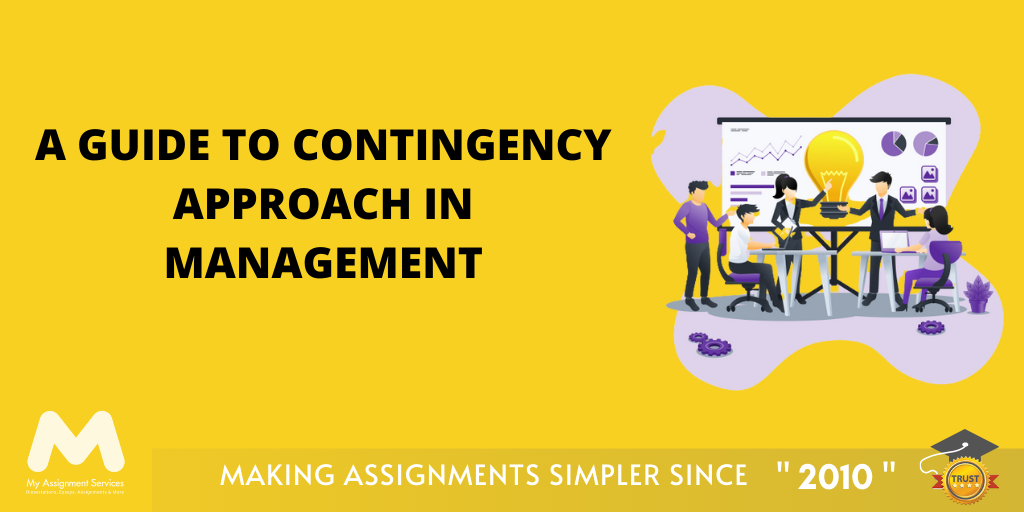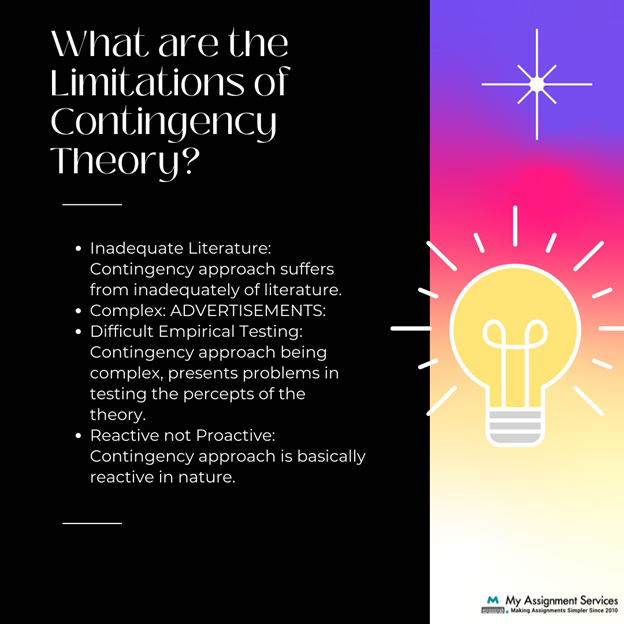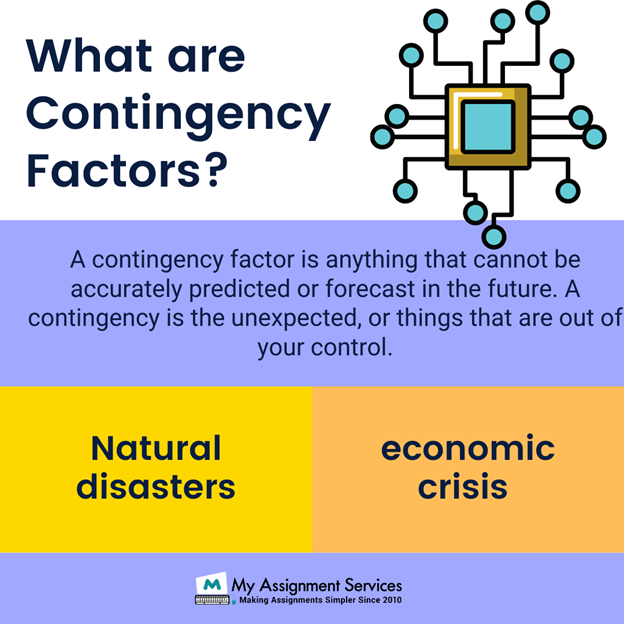A Guide to Contingency Approach in Management
Expert Academic Assistance Since 2010
- Assignment
- Homework
- Dissertation
- Thesis
- Coursework
- Essay
- Case Study
- Discussions
- Report Writing
- Research

Get a Quote & Save 30%
Book All Semester Assignments at 30% OFF!
Order NowExpert Academic Assistance Since 2010

Get a Quote & Save 30%

Among the most essential in your management degree is the contingency theory of management. Students are frequently assigned homework, research papers, and projects relating to the contingency management strategy. This blog will provide a guide to the concept and answers to some frequently asked questions about the contingency approach in management.
Any event or circumstance that is likely to occur in the future but whose presence is uncertain is referred to as a contingency. We can deduce from this that the contingency theory is concerned with uncertainty. The contingency theory is a set of behavioural theories that can be used to forecast organizational behaviour. The contingency management theory discusses how leadership, management, and decision-making are affected by uncertainty. One can acquire important insights on leadership techniques by using contingency thinking.

According to the contingency approach to management, managerial activities and organisational design must be adjusted to the circumstances, and a certain action is only practicable under certain conditions. There is no one-size-fits-all management technique; everything is dependent on the situation. To put it another way, the external environment has an impact on management decisions. Every problem does not have a one-size-fits-all answer. The conditions dictate what a manager does, and there is a large and diverse group between situational elements and organisation performance.
Our management assignment help experts say that the environment, management concepts and techniques, and the contingent interaction are the three primary parts of the overarching conceptual framework for a contingency approach to management.
After the rising popularity of the systems approach, there was a clear rise of the contingency approach to management. Contingency theorists embrace the organization's open adaptive nature as well as the interdependency of its many sub-systems. They have, however, pointed out that the system's approach fails to effectively describe the precise relationship between the organisation and its surroundings. It's too abstract and hard to put into practice. They've attempted to change and operationalize the system's framework.
The systems approach to management adopts a complete picture of human beings and takes a wider view of organisational variables. It considers the complete range of human desires and motivations. The contingency approach to management, on the other hand, is focused mainly on the structural adaptation of the organisation to the task environment. Both of these points of view, however, are not mutually incompatible. They should be considered complementary to one another. Under the contingency strategy, the manager should employ systems and other approaches.

Fielder's Contingency Theory, created by Fred Fielder, asserts that there is no single successful way to operate an organisation. Leaders need to know when and how to change their management styles depending on the situation or the demands of their subordinates. To do so, the company leader must evaluate numerous aspects of the organization's operation using the "least preferred coworker (LPC) scale." Fielder created this tool to help managers figure out who they have the best relationships with and who they dislike working with the most.
The fundamental variation among contingency and situational leadership is that in contingency leadership theory is a leader's style of leadership that should be tailored to the appropriate situation, whereas situational leadership theory makes the leader's style adapt to the current situation.
Internal and external factors influence how business executives approach contingency theory. Some factors are uncontrollable, needing a different strategy than those that can be regulated from within. This equation takes into account the size of the company, the employee-to-manager ratio, and each manager's natural leadership style. These types of internal variables are prevalent. External variables include the marketplace and client attention.
The quality school of management is a complete philosophy for leading and operating an organisation with the goal of continuously increasing performance by focusing on customers and meeting the demands of all stakeholders. To put it another way, this notion focuses on controlling the entire business in order to provide high-quality service to clients.
In its theory, the quality school of management considers the following:
The Makeup of the organisation. Customers and suppliers are intricate systems that make up organisations. Everyone, including executives, managers, and employees, serves as both a supplier and a customer.
Goods and services of high quality. Meeting the needs of customers is a top priority goal that is thought to be crucial to the organization's survival and success.
Improvements in goods and services are made on a regular basis. Recognizing the importance of identifying internal and external requirements and striving for continuous improvement. It is a concept that states, "The company is good, but it can always improve."
Employees who work in groups. These are the major vehicles for problem-solving and planning.
It creates an atmosphere of transparency and trust. Confidence across all levels of an organization's members is critical to its success.
To avoid quality issues, quality management engages employees in decision-making. The Kaizen (pronounced kyzen) approach to people, products, and processes is based on gradual, continuous improvement. The reengineering strategy focuses on recognising the need for change, anticipating change, and effectively responding to it when it occurs. In the following sections, we'll go over both ways.
Henceforth, the resolve to work toward steady, continuous improvement is known as kaizen. An organisation of individuals who place a high value on learning is the finest support for continual progress. Everyone in the organisation participates in this process by finding areas for improvement, testing new ways, recording the outcomes, and making recommendations for adjustments.
In a nutshell, the contingency approach is a management theory that asserts that the best management style is based on the circumstances and that adhering to one rigid style is worthless for a long time.
To get the management assignment help, check out My Assignment Services. We are the top-notch assignment writing service provider in Australia. Getting help from us will give you so many perks including:
Hurry up! Fill the form, and we’ll get back to you in the shortest time.
Prev Post
Guidelines To Write Diagnostic Essay: 10+ Topic Ideas To Choose From
Next Post
Comprehensive Guide to Acute Scalene Triangle
© Copyright 2010 - 2025 Assignment Help by My Assignment Services. All Rights Reserved.
Please Wait..